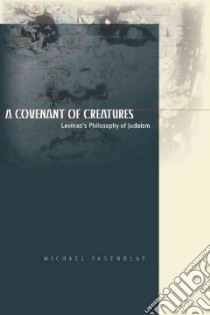A Covenant of Creatures - 9780804768702
Un libro in lingua di Michael Fagenblat edito da Stanford Univ Pr, 2010
- € 26.20
- Il prezzo è variabile in funzione del cambio della valuta d’origine
"This is a rich and sophisticated study of one of the most vital and influential thinkers of the 20th century. Exploring Levinas's philosophy of Judaism from his philosophical rather than his confessional writings, Fagenblat provides a fresh model that breaks down simplistic distinctions and opens the in-between space wherein the claim of the individual is held accountable through the response to the other and the challenge of the other redeemed by the demand of the individual."---Elliot R. Wolfson, New York University
"According to the famous Talmudic story in which a heathen challenges Hillel to reveal the whole of Torah while standing on one foot, the sage not only declares its essence to lie in the ethics of neighbor-love, relegating the rest to the status of `mere' commentary; he enjoins his interlocutor to study that very textual supplement. Michael Fagenblat has made an utterly compelling case that a similar injunction is at work in Levinas's conception of ethical responsibility in the face of the Other. It, too, implies that this strange creature---the neighbor---can only be revealed exegetically, in the working through of the hermeneutic dimension of the urgent phenomenological `givenness' of the Other. In this beautifully written and conceptually rigorous page-turner, Fagenblat teaches us to resist the impasses of prior readings of Levinas, which remain stuck within the sterile opposition of phenomenology and theology, Athens and Jerusalem, thinking and reading, mind and tradition. Fagenblat allows us, finally, to grasp the genre proper to Levinasian thought: phenomenology as midrash."---Eric L. Santner, University of Chicago
"I am not a particularly Jewish thinker," said Emmanuel Levinas, "I am just a thinker." A Covenant of Creatures argues against the idea, affirmed by Levinas himself, that Totality and Infinity and Otherwise than Being separate philosophy from Judaism. By reading Levinas's philosophical works through the prism of Judaic texts and ideas, Michael Fagenblat contends that what Levinas called "ethics" is as much a hermeneutical product wrought from the Judaic heritage as a series of phenomenological observations. Decoding Levinas's philosophy of Judaism within a Heideggerian and Pauline framework, Fagenblat uses biblical, rabbinic, and Maimonidean texts to provide sustained interpretations of the philosopher's work. Ultimately, he calls for a reconsideration of the relation between tradition and philosophy and of the meaning of faith without the foundations of epistemology.
Informazioni bibliografiche
- Titolo del Libro in lingua: A Covenant of Creatures
- Sottotitolo: Levinas's Philosophy of Judaism
- Lingua: English
- Autore: Michael Fagenblat
- Editore: Stanford Univ Pr
- Collana: Stanford Univ Pr (Paperback)
- Data di Pubblicazione: 03 Giugno '10
- Genere: PHILOSOPHY
- Argomenti : Ethics, Modern Judaism Philosophy Philosophy, French 20th century
- ISBN-10: 0804768706
- EAN-13: 9780804768702


